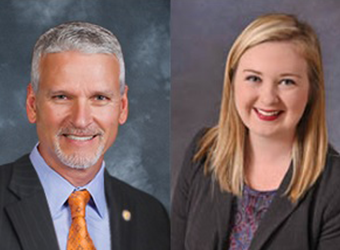Guest presenters:
- Sen. Keith Perry (R-Gainesville)
- Rep. Amber Mariano (R-Hudson)
FCAN Host: Deborah Martin, Policy Analyst
Florida lawmakers passed 275 bills and a record-breaking $112.1 billion budget during the most recent legislative session.
Major policy changes included additional efforts to unify workforce education initiatives, substantial modification of the state’s standardized testing system, and the creation of a new nursing program to address a critical workforce need.
On May 5, FCAN hosted a webinar highlighting some of the bills impacting education beyond high school throughout Florida. Unless otherwise indicated, all the bills discussed below — along with the budget — are waiting for Gov. Ron DeSantis’s signature.
The webinar also welcomed a pair of policymakers to discuss some of the legislation they championed as they work to help build a Talent Strong Florida.
Sen. Keith Perry on “education for student inmates”
Committee substitute for Senate Bill (CS/SB) 722 provides additional educational opportunities for certain inmates in the correctional system.
Under this bill, the Department of Corrections (DOC) can now partner with a Florida College System (FCS) institution to provide educational services to eligible inmates with 24 months or less time remaining on their sentence. This bill takes effect on July 1.
“One of my passions has been criminal justice reform,” said Sen. Keith Perry (R-Gainesville), who added that he helped found a prison ministry in Gainesville more than 25 years ago.
Perry, who sponsored the bill, said it is a way to intellectually engage inmates and help establish good habits that will be beneficial upon their release.
“For them to be successful post-release is dependent on what we do while they are incarcerated,” Perry said. “I look at this (bill) as an incredible opportunity.”
Rep. Amber Mariano on “tuition transparency” and addressing Florida’s nursing shortage
Rep. Amber Mariano (R – Hudson) also joined the webinar to provide insight on a pair of bills impacting postsecondary education.
Senate Bill (SB) 7044 focuses on textbook affordability and tuition transparency for students. In part, the bill mandates that a list of both required and recommended textbooks be posted at least 45 days before the first day of class. Additionally, tuition and fee costs — as well as any changes — must be prominently featured on the postsecondary institution’s website in a manner that is easily obtainable. This bill was signed on April 19 and takes effect on July 1.
“This will allow our students to make better-informed choices as consumers,” Mariano said.
Mariano also discussed SB 2524, which in part creates the PIPELINE and LINE Funds to address Florida’s critical workforce shortage in nursing. The bill provides a matching grant intended to foster collaboration between healthcare providers and nursing education programs. This bill takes effect on July 1.
“We don’t have enough seats available for the students who want to enter nursing programs in our public institutions,” said Mariano, who added that the demand has only been exacerbated by the COVID-19 pandemic. “Because of our low tuition rates in our universities and our colleges, we have a lot of students who want to go there.”
Other session highlights
As part of the $112.1 billion budget — the largest in state history — the State University System (SUS) received $3.53 billion in funding, FCS received $1.5 billion, and workforce education initiatives were funded at $583 million.
This is also another year where Florida did not have any tuition increases, a continued effort on the part of the Florida Legislature to keep the state’s higher education system affordable.
Notable funding for state financial aid programs included $75.4 million for the Florida EASE Grant (which provides funding for almost 38,000 students in the state), and $620.9 million for the Florida Bright Futures Scholarship Program.
The webinar also highlighted CS/HB 461, which will allow students applying for Bright Futures to substitute work experience for the volunteer service requirement starting in 2022-23.
“This is a way to make sure (Bright Futures) is as accessible as possible to all students,” Mariano said.
Show Notes
To learn more about recent legislation impacting postsecondary education — or to view the recording and download the presentation — take advantage of these resources:
Recording
Slides
FCAN’s 2022 Legislative Session Recap
Be sure to visit our Past Webinars page for access to recordings and downloadable material from FCAN’s previous presentations.

